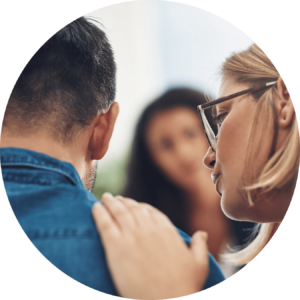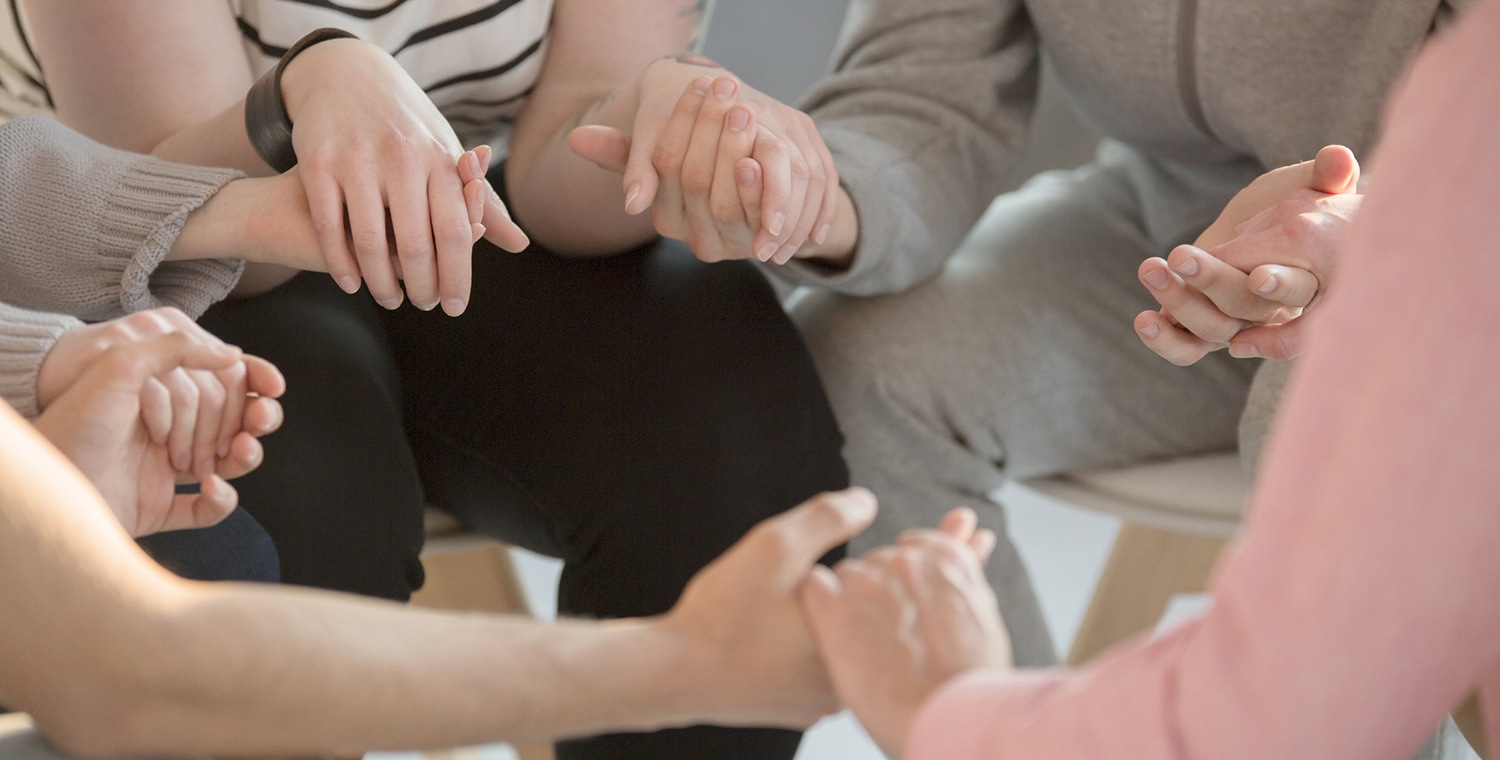Note: This article was originally published in the Spring 2004 issue of MeadowLark, the magazine for alumni of The Meadows.
Until You Can Love Yourself
By Lawrence S. Freunclich
At our first AA meeting, many of us were so sick and hungover that the most we could hope for was to sit still for an hour without crying or throwing up. That last culminating drunk had wiped us out. We needed help, but we were as frightened of asking for it as we were of another drink. We huddled in against ourselves and tried to disappear. The friendly gestures and words of welcome sounded false to us, and we thought we were among naïve dogooders, or perhaps religious fanatics who had lost contact with reality. We felt we were special; and we were humiliated to be associated with a group of losers, who, unlike us, were just a bunch of common drunks. We felt we would never be able to make them understand what made our own stories so special. We didn’t know where to rest our eyes or what to do with our hands. Each time someone shared, we took it personally, as if each remark were aimed directly at us. We wanted to interrupt to show how much we knew, of how different we were. We wanted everyone to understand how we had been wronged. Most of us, however, were too frail to speak.
During our first 30 days of meetings, if someone said how grateful she was for the peace and hope that sobriety had given her, we thought that only a person with a shallow understanding of life could be so easily sedated by the homilies of AA. If someone expressed his rage, we grew frightened, feeling as if his energy were somehow a direct personal threat to us. If someone told us how they got drunk at the business meeting, we belittled his exploits because we had done so much worse. If someone shared that she hated people who shared petty annoyances, we thought she was talking about us. If someone expressed her gratitude for having gone from bankruptcy to wealth, not only did we think her a braggart, but we felt the hot humiliation of our own awful financial desperation and how we had failed our loved ones. Some of us attended meetings and never raised our hand. Others of us, when we finally talked, couldn’t shut up, as if we had to tell the world our whole story in one breath. No matter what we said, we felt that we had made fools of ourselves or, worse, that no one in the group could possibly understand us.
 Yet we always felt like phonies. In this early stage of our AA solitary confinement, we were in the soul-mangling grip of what AA calls “self-centered fear.” When we learned more about self-centered fear, we would hear ourselves described as “arrogant doormats” or “that piece of garbage around which the entire universe revolved.” We felt that all eyes were on us, that we were in a play with a large cast – but the spotlight was on us only, and that the characters we were portraying were worthless and had to deny it. We were obsessed with people we despised, and those people were ourselves. As the weeks went by and somehow “we kept coming back” “one day at a time,” because we had “smart feet” and went to meetings “even if our ass fell off,” we recognized that not only did we have self-centered fear, but that every other addict in the room did as well.
Yet we always felt like phonies. In this early stage of our AA solitary confinement, we were in the soul-mangling grip of what AA calls “self-centered fear.” When we learned more about self-centered fear, we would hear ourselves described as “arrogant doormats” or “that piece of garbage around which the entire universe revolved.” We felt that all eyes were on us, that we were in a play with a large cast – but the spotlight was on us only, and that the characters we were portraying were worthless and had to deny it. We were obsessed with people we despised, and those people were ourselves. As the weeks went by and somehow “we kept coming back” “one day at a time,” because we had “smart feet” and went to meetings “even if our ass fell off,” we recognized that not only did we have self-centered fear, but that every other addict in the room did as well.
Something startling – and for many of us, unprecedented – had been taking place. For the first time in many years, or perhaps for the first time in our entire lives, we had been learning to listen – learning to listen to something other than the voices in our own heads. We didn’t know it, but our world was beginning to get a little larger. No cross talk! What a challenge. With listening came identification. With identification came emotional bonding; we came to see that the other addicts in the room had gone through the same kind of hell we had. They had gotten just as sick, lost just as much money, offended their loved ones, crashed cars, told embarrassingly bad lies and cursed God.
These commonalities began to fascinate us, and our attention was diverted from ourselves to others. We were becoming less self centered. As the reality and similarity of our colleagues sunk into our hearts and minds, we began to see that our stories were not unique and that other people could understand what we had been through. Even when a share made us angry or contemptuous, we sat still and let the person have his say. It was all right for them to show their imperfections; after all, they were only human. And if they were only human, it was easier to admit that we were only human. This was a spiritual breakthrough for us. Surrendering to the truth of our own humanity was a key spiritual gift. For us alcoholics, our imperfection had always been experienced as shame; it had made us allergic to our own humanity and forced us into emotional adaptations aimed at denying our imperfection.
Until that breakthrough moment in AA, we had never believed that anyone could love us if they knew the truth of who we were. “Hide that truth at any cost,” our alcoholic brains screamed out to us. Drown it in booze and lies. Some of us mocked the homilies of AA that were tacked up on the walls of the meeting room, sayings like, “Stinkin” Thinkin,”; “Put a Plug in the Jug,” “Let Go and Let God,” and “We row; God steers.” But even we mockers found our eyes continually drawn back to one motto, which never seemed to go stale. It was the sign that said, “We Will Love You Until You Can Love Yourself.”
When we celebrated our 90 days, we felt blessed by what AA had so far done for us. We felt as if we had rejoined the community of man, and now we thought we understood what the old-timers were talking about when they said that AA “was a we program.” We had a fledgling faith – or if it wasn’t yet faith, we dared hope that the love of our fellow AAs could give us the self-esteem that our addiction had destroyed. If we kept coming to meetings, we would experience the loving that we were not yet capable of believing we deserved.
And, for many of us, the support of our AA colleagues kept us sober for years. We saw our lives improve. We saw that, if we stayed sober and practiced the principles of AA in all of our affairs, our relationships matured and we found the strength to survive the rough patches of life: things like losing our jobs, divorce and the refusal of the children we had abused to forgive us. We found the patience to deal with people at the job who annoyed us.
During our years in AA, many of our friends had gone back to drinking. Some died; some we never heard of again. Some came back into the room and reported that the hell in store for the recidivist was there for the taking. They added, “The misery is optional.” Many of us believed what we had heard about the misery being optional. Despite the fact that we continued to go to meetings, we could feel, after 5, 10, 15 years, the alcoholic demons beginning to rise up within us again. We felt that the AA program had done us good, and we were grateful for it. But there were parts of us that remained in pain and refused to be medicated by the traditions, steps and people of AA. For us, the inevitable occurred. We joined the ranks of the slippers. And, sure enough, we discovered the misery we had been told awaited us.
As we began the arduous and humiliating process of “coming back” (and some of us would do it several times), some of us were overtaken by a sense of alcoholic doom. We became convinced that, even with AA’s constant offer of forgiveness, understanding and guidance, that a part of us was too damaged to heal. Even if we couldn’t be precise about it, the promise that “We will love you until you learn to love yourself” was for us a nice thought, but a beneficent fantasy.
What we did not know was that the abuse our caregivers had inflicted on us in childhood had so damaged our awareness of our inherent worth that any promise of love stirred up post traumatic associations. The promise that our colleagues in AA would love us until we learned to love ourselves was offered in tenderness and compassion, but we were hard-wired to reject it. It sounded to us just like our parents. People like us would slip and slide until they wound up where AA had predicted: in jail, dead or in a mental institution.
[perfectpullquote align=”full” bordertop=”false” cite=”” link=”” color=”” class=”” size=””]The only kind of love that was going to work for people like us needed to come from caregivers who were trained to discover the etiology of our abusive childhoods – and who, when our trauma histories were clear to us, could teach us the practice of boundaries so we could protect ourselves from the posttraumatic stress that triggered our alcoholism and relational dysfunction.[/perfectpullquote]
Our caregivers had to be healthy themselves. We would not be cured if they came at us from a position of superiority. That would plunge us back into childhood. To the extent that their own trauma histories escaped the containment of healthy boundaries, our caregivers would infect us with their own dysfunctions.
When people like us came to The Meadows, most of us desperate and without a clue that we had at last come home, we had no idea how lucky we were. We were finally at a place where we could love ourselves, and because we could, we also could love others. For those of us who still loved and valued AA, because we, at long last, had a spiritual awakening, we felt the personal responsibility to carry this message to the suffering alcoholic.

